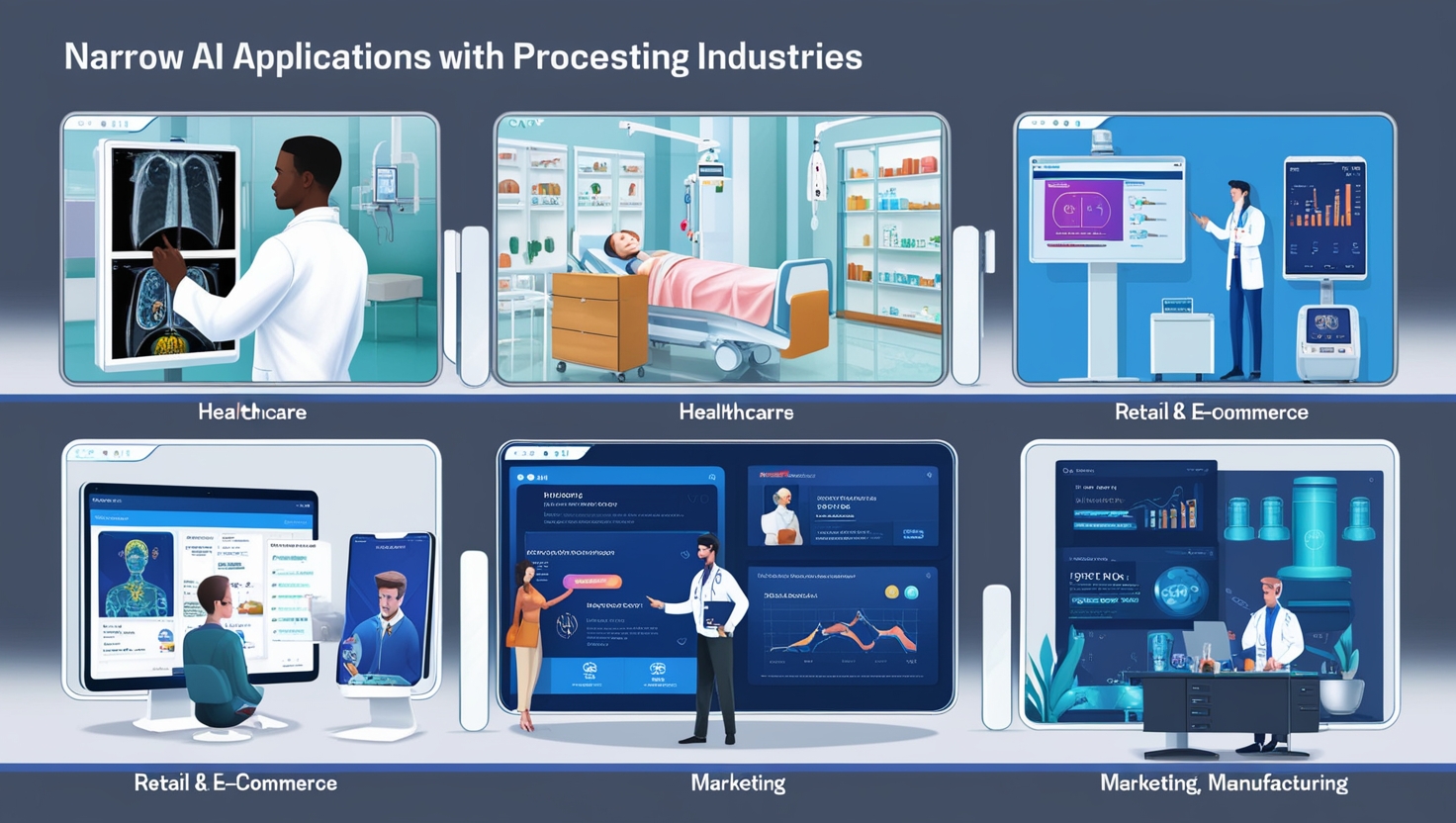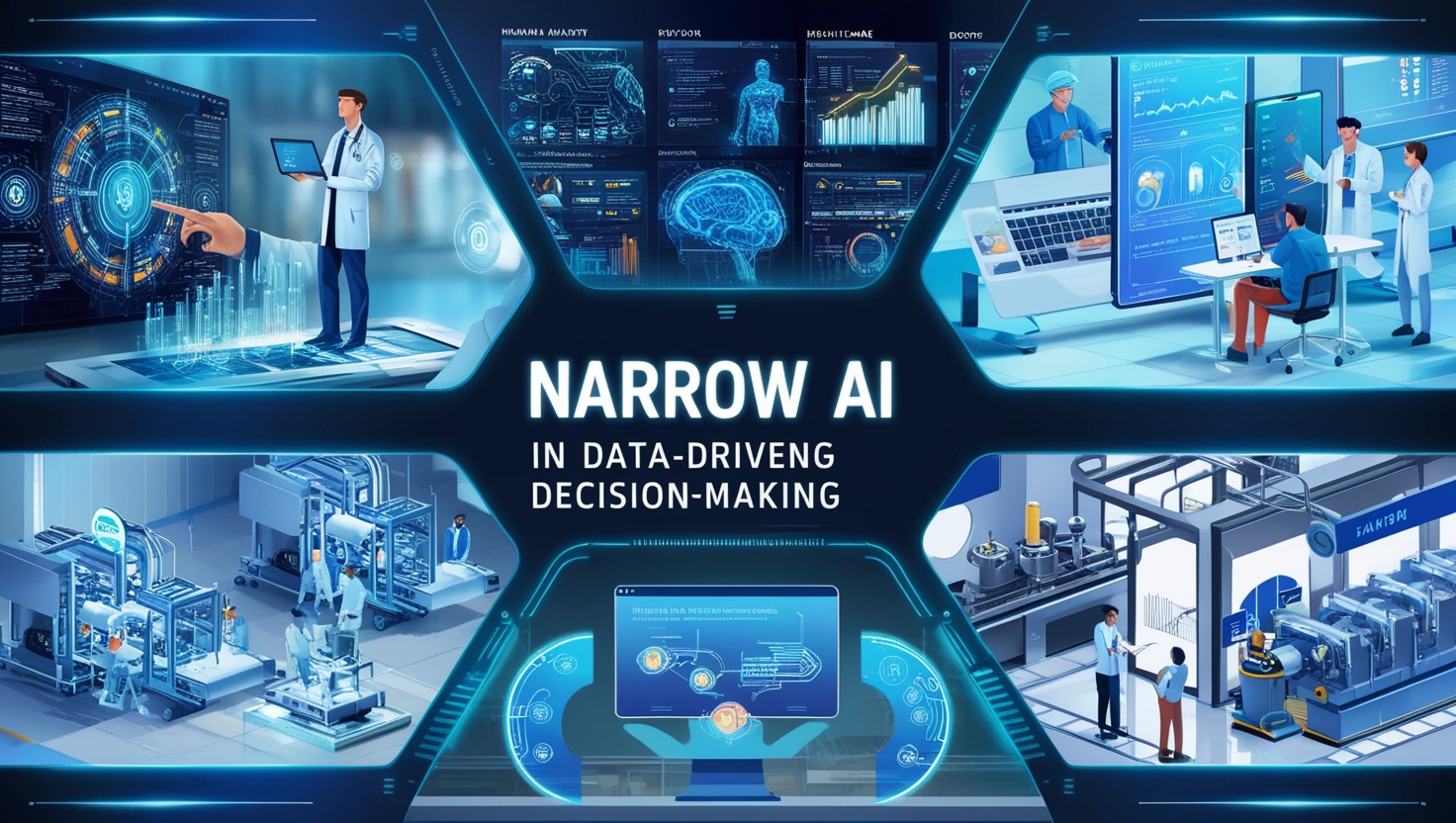Data has become one of the most valuable assets for businesses and industries worldwide. However, raw data alone is not enough—transforming it into meaningful, actionable insights is what truly drives success. This is where Narrow AI comes into play. Unlike General AI, which aims to replicate human intelligence in all areas, Narrow AI is built to specialize in specific tasks. It’s really good at handling huge amounts of data, finding patterns, making predictions, and helping people make smarter decisions.
With its ability to focus on specific tasks, Narrow AI is changing the way we make sense of data and use it to drive smarter decisions. From healthcare to finance, businesses are leveraging Narrow AI to gain deeper insights, improve efficiency, and make smarter decisions that drive real-world impact.
Let’s take a closer look at how Narrow AI is changing the way we analyze and understand data, turning it into real, valuable insights.
What is Narrow AI?
Narrow AI, also known as Weak AI, is designed to solve specific tasks, such as image recognition, language translation, or recommendation systems. Unlike General AI, which aims to mimic human cognitive abilities across all areas, Narrow AI specializes in one or a few tasks, excelling within those boundaries. For example, AI-powered tools that recommend products based on browsing history are forms of Narrow AI, designed solely for the purpose of understanding and predicting user preferences.
Key Characteristics of Narrow AI
- Specialized Capabilities: Narrow AI is built to excel in one domain, such as medical diagnostics, without the ability to generalize to other tasks.
- Data-Driven Learning: These systems depend on vast data sets to find patterns and make predictions.
- Limited Scope: While Narrow AI is incredibly efficient in its specialized area, it lacks general reasoning abilities. It’s not capable of making decisions outside its programmed scope.
How Narrow AI Transforms Data into Actionable Insights
Data Collection and Preprocessing
Before Narrow AI can generate meaningful insights, it first gathers data from various sources. This could include sensors, user interactions, transaction logs, or social media activity. The raw data then undergoes a critical preprocessing phase where it is cleaned, organized, and formatted to make it usable for analysis. For example, in healthcare, Narrow AI might preprocess medical images to highlight areas of concern for further examination by doctors.
The Role of Machine Learning and Deep Learning
- Machine Learning (ML): Narrow AI utilizes ML algorithms to identify patterns in data. For instance, an AI system could analyze historical sales data and use that to predict future demand.
- Deep Learning: By using neural networks, Narrow AI can handle complex data sets, such as identifying anomalies in vast amounts of medical records or customer transactions.
Real-Time Data Processing
One of the most powerful aspects of Narrow AI is its ability to process data in real-time. This allows for immediate action based on fresh insights. For example, fraud detection systems in banking use Narrow AI to monitor transactions in real-time, immediately flagging suspicious activities.
Turning Insights into Action
The real value of Narrow AI lies in its ability to not only analyze data but also recommend actions. For example, in marketing, Narrow AI can analyze customer data to recommend personalized advertisements, improving customer engagement and sales conversion rates. Similarly, in manufacturing, AI can suggest when to perform maintenance on machinery to avoid breakdowns and costly downtimes.
Applications of Narrow AI in Transforming Data into Insights

Healthcare
In the healthcare industry, Narrow AI is making a profound impact:
- Predictive Analytics: AI models predict the likelihood of certain conditions, such as heart disease, enabling early intervention.
- Diagnostic Tools: AI systems assist doctors by analyzing medical images, such as X-rays, to spot potential issues, often with greater precision than human doctors.
Retail and E-commerce
For retailers and e-commerce platforms, Narrow AI revolutionizes customer engagement:
- Recommendation Systems: Personalized product suggestions based on previous customer behaviours and preferences enhance shopping experiences.
- Inventory Management: AI helps optimize stock levels by predicting demand, reducing waste, and ensuring that popular items are always available.
Finance
The financial sector also benefits significantly from Narrow AI:
- Fraud Detection: AI systems scan transaction data to identify potential fraud in real-time, ensuring security and trust in financial transactions.
- Investment Tools: AI models help investors by analyzing stock market trends and providing actionable insights to maximize returns.
Marketing
In marketing, Narrow AI can significantly enhance strategy:
- Targeted Advertising: AI uses consumer data to create personalized advertisements that resonate more with individual consumers.
- Customer Sentiment Analysis: AI analyzes social media and other online data to gauge public sentiment, helping brands tailor their campaigns effectively.
Manufacturing
In manufacturing, Narrow AI is vital for operational efficiency:
- Predictive Maintenance: AI systems predict when machinery is likely to fail and schedule maintenance to prevent costly breakdowns.
- Process Optimization: AI analyzes production data to suggest improvements that streamline operations and enhance quality control.
Benefits of Narrow AI in Data-Driven Decision Making

Enhanced Accuracy
By processing massive amounts of data, Narrow AI can identify patterns that humans might miss, leading to more accurate and reliable insights.
Improved Efficiency
Narrow AI speeds up the process of generating insights, allowing businesses to make decisions more quickly. This is particularly useful in fast-paced industries like finance and healthcare, where timely information is critical.
Cost Savings
By optimizing processes and improving decision-making, Narrow AI helps companies reduce costs. For example, predictive maintenance in manufacturing prevents costly repairs and downtime, while targeted marketing strategies reduce wasted advertising spend.
Personalization
Consumers expect personalized experiences, and Narrow AI delivers by tailoring recommendations and marketing messages based on individual preferences. This enhances user satisfaction and drives sales.
Scalability
Unlike traditional methods, It can handle and analyze large volumes of data without requiring additional human resources, making it scalable for businesses of all sizes.
Challenges and Limitations of Narrow AI in Data Insight Generation
Data Quality and Bias
For Narrow AI to generate accurate insights, the data it analyzes must be of high quality. Biased or incomplete data can result in misleading conclusions, which could negatively affect decision-making.
Data Privacy Concerns
As AI systems collect vast amounts of personal data, privacy issues become a significant concern. Ensuring that Narrow AI adheres to data protection regulations is crucial.
Overfitting and Underfitting
AI models may sometimes overfit specific datasets, making them less adaptable to new data. Conversely, underfitting occurs when a model is too simplistic, missing critical patterns.
Complexity of Implementation
Integrating Narrow AI into existing systems can be technically challenging and resource-intensive. Organizations must invest in the right infrastructure and expertise to make the most of AI technology.
The Future of Narrow AI in Data Insight Generation

Advancements in AI Algorithms
As machine learning and deep learning technologies continue to evolve, Narrow AI will become even more powerful, capable of processing larger and more complex data sets to provide even more accurate insights.
Integration with Emerging Technologies
The future of Narrow AI includes integration with emerging technologies like the Internet of Things (IoT), cloud computing, and edge computing. This will enable AI to analyze real-time data from various sources more efficiently.
Ethical AI and Responsible Use
With great power comes great responsibility. As Narrow AI becomes more widespread, ethical considerations regarding transparency, fairness, and accountability will be paramount.
AI in Real-Time Decision Making
The role of Narrow AI in real-time decision-making will continue to grow. Its ability to quickly process and act on data will enable more dynamic and agile decision-making across industries.
Conclusion
Narrow AI is already transforming industries by turning vast amounts of data into actionable insights. From healthcare to finance, its ability to enhance decision-making, improve efficiency, and create personalized experiences is reshaping how businesses operate. While there are challenges to overcome, such as data quality and privacy concerns, the future of Narrow AI looks promising. As AI technology continues to evolve, it will play an even greater role in shaping the future of data-driven decision-making.
Frequently Asked Questions (FAQs)
1. What is the difference between Narrow AI and General AI in terms of data insights?
Narrow AI
It specializes in analyzing specific data sets to generate insights within a defined scope, whereas General AI would theoretically analyze any data and produce insights across all domains.
2. Can Narrow AI be used in real-time data analysis?
Yes, Narrow AI is excellent for real-time data analysis, such as fraud detection, dynamic marketing strategies, and process optimizations, where immediate action is necessary.
3. How can businesses use Narrow AI to improve decision-making?
Businesses can leverage Narrow AI to analyze data quickly and uncover hidden patterns, helping them make better decisions in areas like marketing, customer service, and resource allocation.
4. What are the ethical concerns related to using Narrow AI for data analysis?
Key concerns include data privacy, the potential for biased algorithms, and ensuring transparency in decision-making, especially in sensitive industries like healthcare and finance.
5. How will Narrow AI evolve in the future in terms of data insights?
With advancements in machine learning and deep learning, Narrow AI will become more efficient at processing large, complex data sets, leading to faster, more accurate insights for real-time decision-making.




